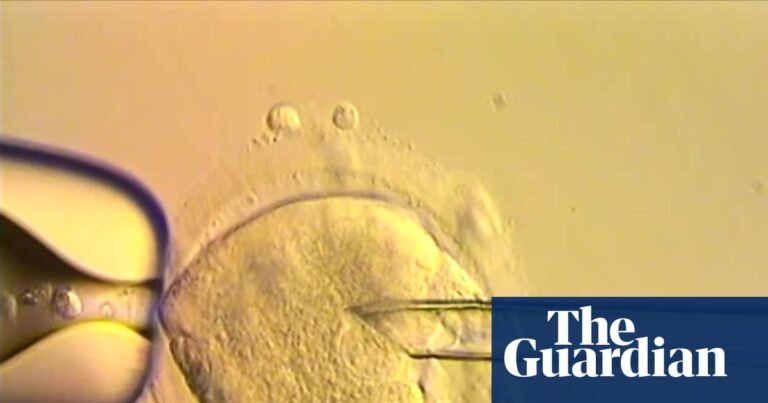Doctors in the UK have announced the birth of eight healthy babies after performing a groundbreaking procedure that creates IVF embryos with DNA from three people to prevent the children from inheriting incurable genetic disorders.
The mothers were all high risk for passing on life-threatening diseases to their babies due to mutations in their mitochondria, the tiny structures that sit inside cells and provide the power they need to function.
News of the births and the children’s health has been long-anticipated by doctors around the world after the UK changed the law to allow the procedure in 2015. The fertility regulator granted the first licence in 2017 to a fertility clinic at Newcastle University where doctors pioneered the technique.
The four boys and four girls, including one set of identical twins, were born to seven women and have no signs of the mitochondrial diseases they were at risk of inheriting. One further pregnancy is ongoing.
Prof Doug Turnbull, who was part of the team that spent more than two decades developing the procedure, said the healthy births were reassuring for researchers and the families affected. “You are inevitably thinking it’s great for the patients and that is a relief,” he said.
Prof Mary Herbert, another senior member of the team, said to have eight healthy babies from the procedure was “rewarding for all of us”.
The vast majority of a human’s 20,000 genes are curled up in the nucleus of nearly every cell in the body. But the fluid surrounding the nucleus contains hundreds to thousands of mitochondria that carry their own set of 37 genes. Mutations in these genes can impair or completely disable mitochondria with catastrophic effects.
People inherit all their mitochondria from their biological mother. Mutations in the tiny battery-like structures can affect all the children a woman has.
The first symptoms of mitochondrial disease tend to appear in early childhood as energy-hungry organs such as the brain, heart and muscles start to fail. Many affected children have developmental delays, require wheelchairs and die young. About one in 5,000 newborns are affected.
Mitochondrial donation treatment, or MDT, aims to prevent children from inheriting mutated mitochondria. The procedure involves fertilising the mother’s egg with the father’s sperm and then transferring the genetic material from the nucleus into a fertilised healthy donor egg that has had its own nucleus removed. This creates a fertilised egg with a full set of chromosomes from the parents, but healthy mitochondria from the donor. The egg is then implanted into the womb to establish a pregnancy.
How mitochondrial donation therapy works
The first eight babies born to the procedure are described in two papers in the New England Journal of Medicine. All eight were healthy at birth. One child developed a urinary infection that was treated, and another developed muscle jerks that resolved on their own. A third child developed high blood fat and a disturbance in their heart rhythm, which was also treated. The condition is thought to be related to a medical issue the mother had in pregnancy.
Genetic tests showed that the babies had no or low levels of mutant mitochondria, with some carried over from the mother during the procedure. While the levels are considered too low to cause disease, it suggests the procedure could still be improved.
“All the children are well and they’re continuing to meet their developmental milestones,” said Bobby McFarland, director of the NHS Highly Specialised Service for Rare Mitochondrial Disorders at Newcastle hospitals NHS foundation trust. Five of the children are less than a year old, two are aged between one and two, and the other child is older.
The mother of one of the girls said: “As parents, all we ever wanted was to give our child a healthy start in life. After years of uncertainty this treatment gave us hope – and then it gave us our baby … we’re overwhelmed with gratitude. Science gave us a chance.”
Some women who carry the genetic disorders produce eggs with varying levels of faulty mitochondria. For them, a technique called pre-implantation genetic testing (PGT) can be used to select eggs for IVF that have a very low chance of passing on a disease. Other women do not have this choice because all their eggs have high levels of mutations.
The Newcastle team said eight of 22 (36%) of women became pregnant after MDT and 16 of 39 (41%) of women became pregnant after PGT. It is unclear why the rates differed, but some mitochondrial mutations may have knock-on effects on fertility.
Writing in an accompanying editorial, Robin Lovell-Badge, a principal group leader at the Francis Crick Institute in London, said the long road to this point had “no doubt been frustrating to women at risk of having children with mtDNA disease”, but praised the scientists’ cautious approach.
